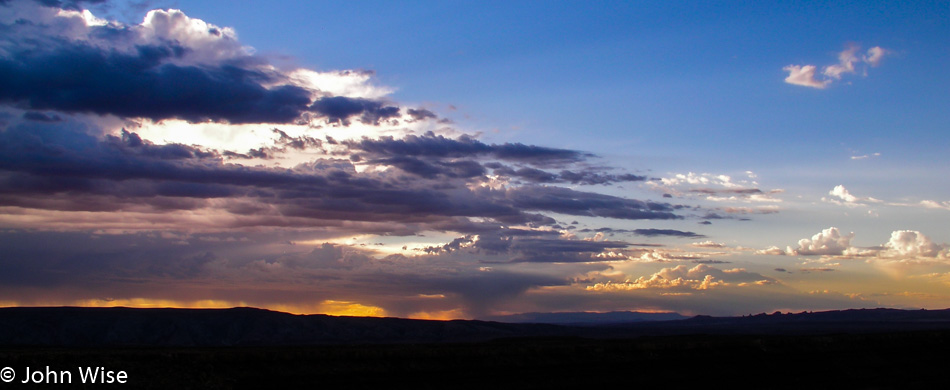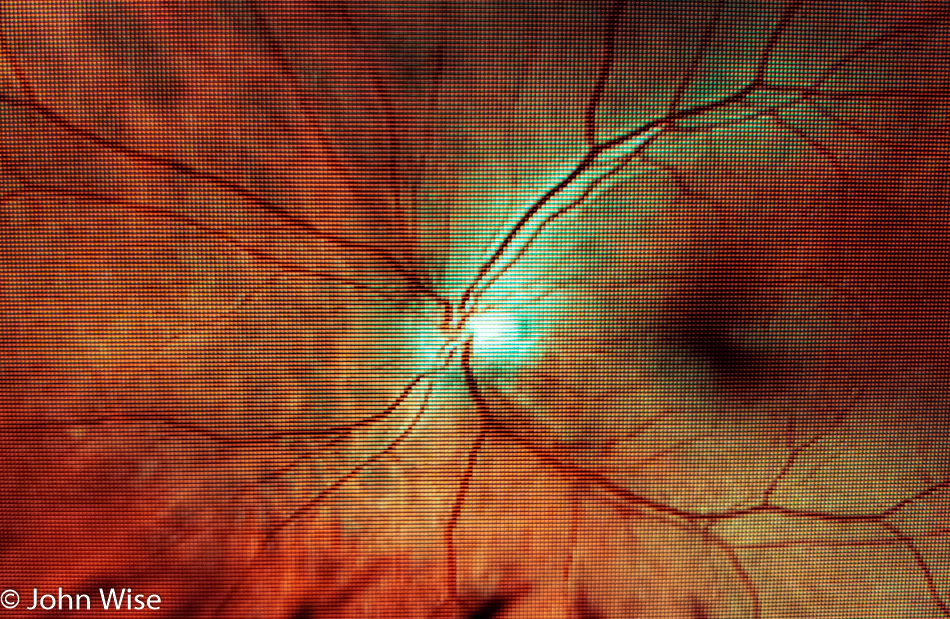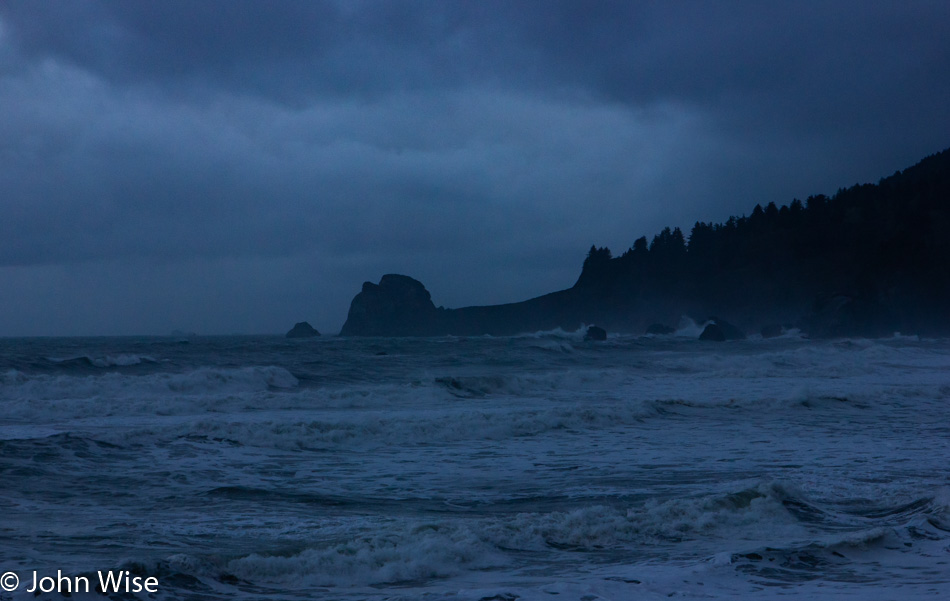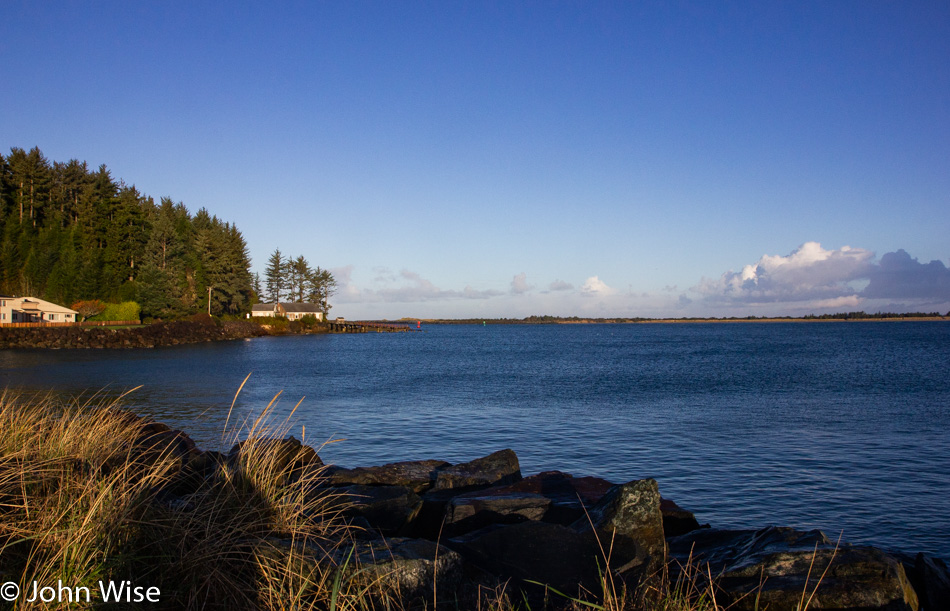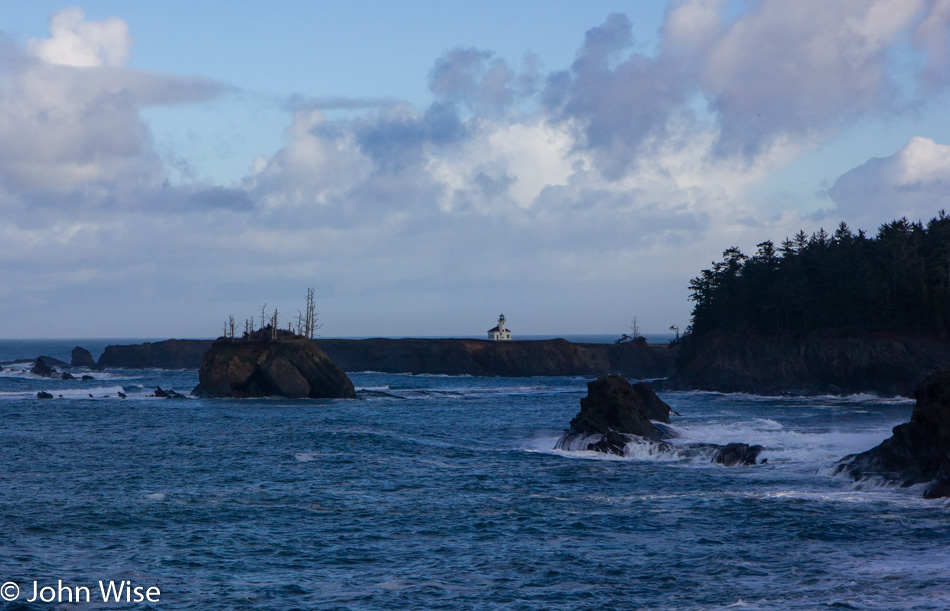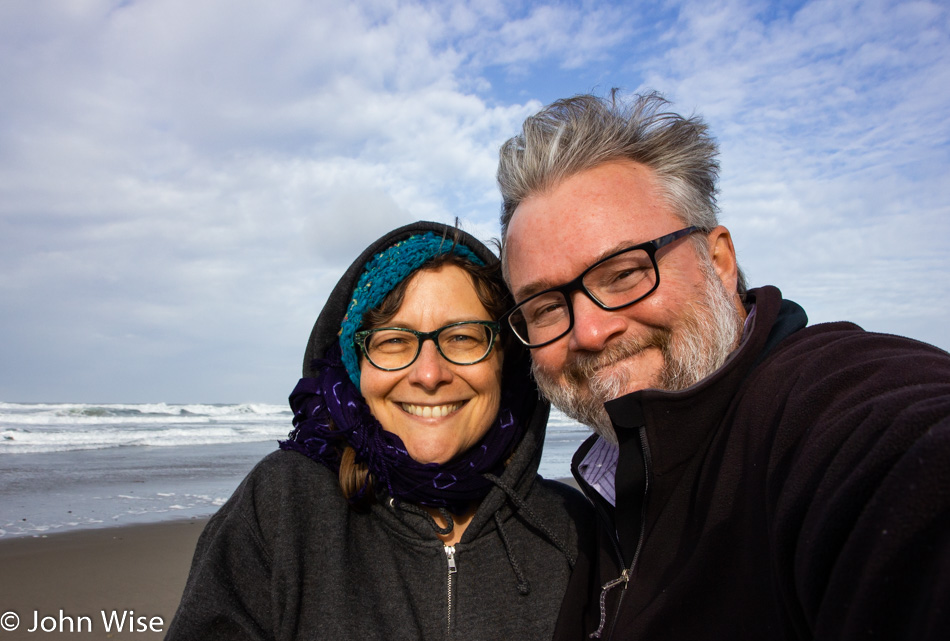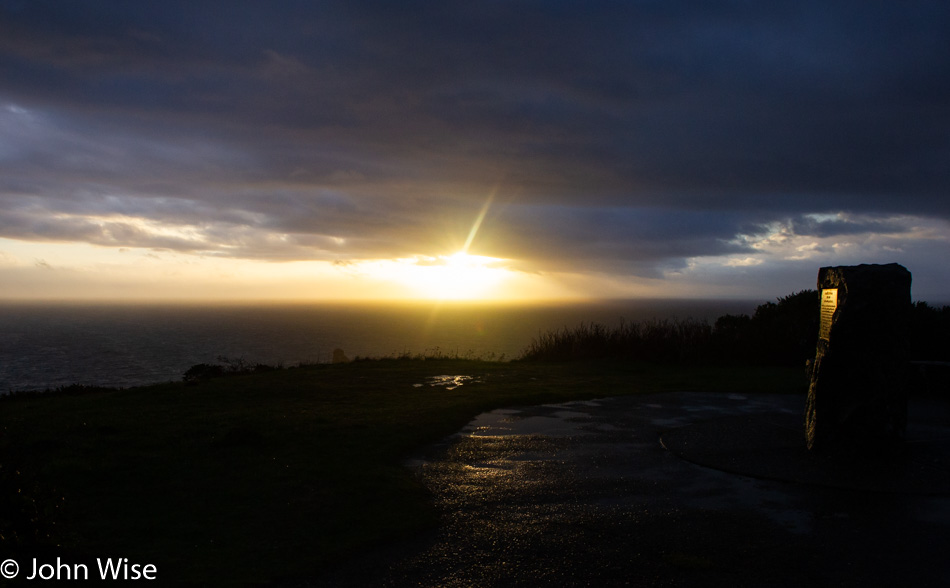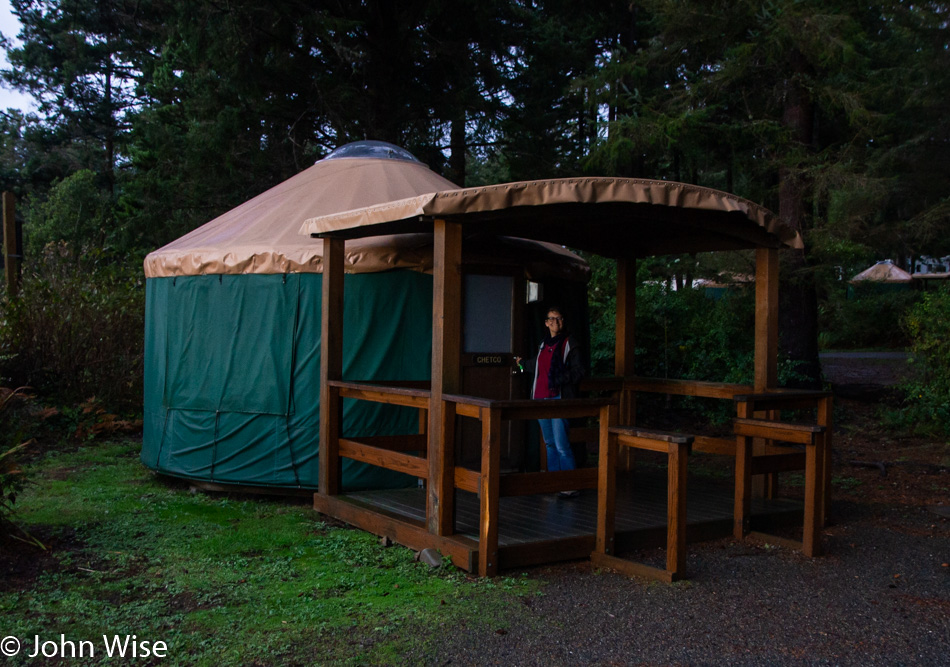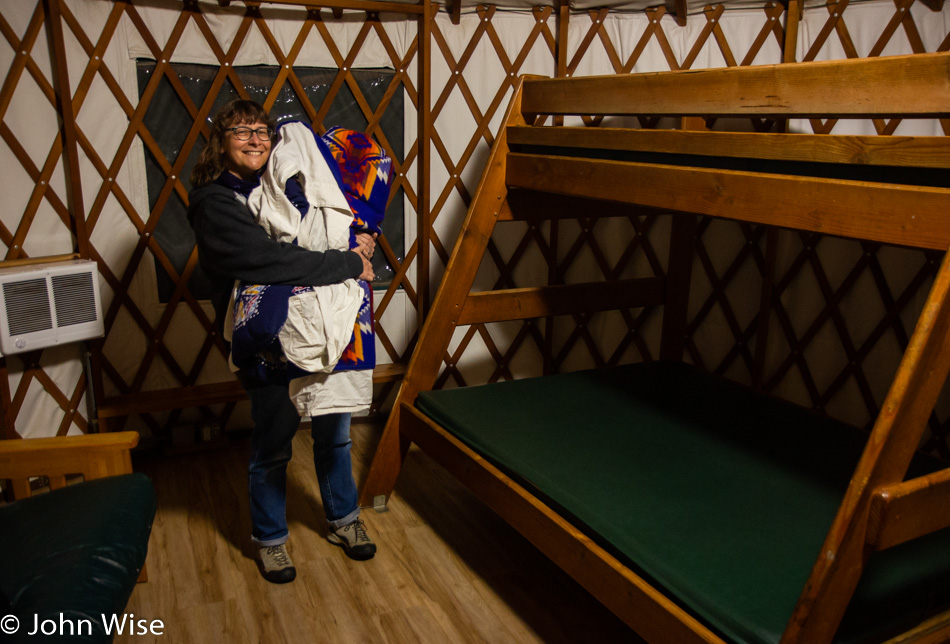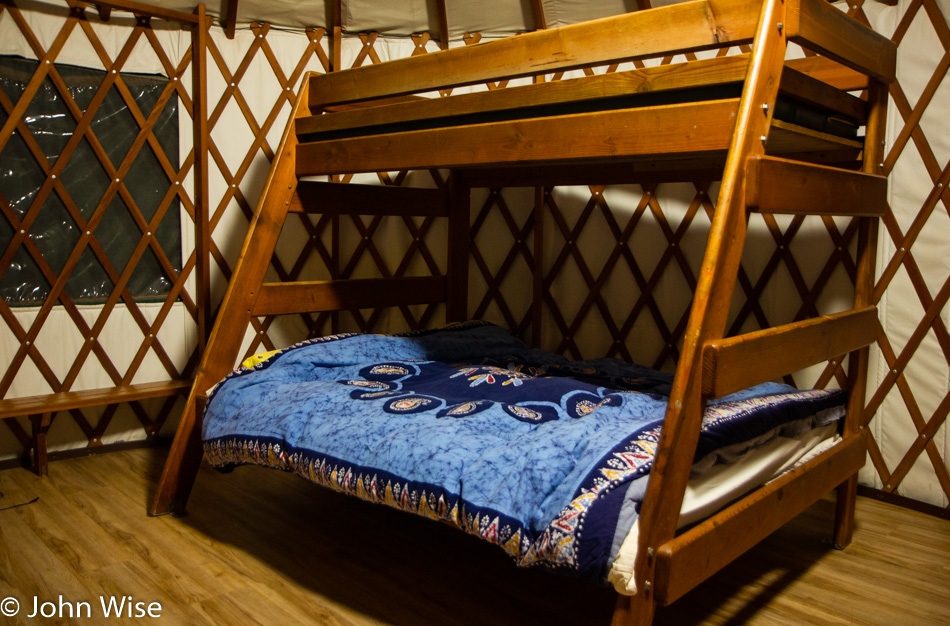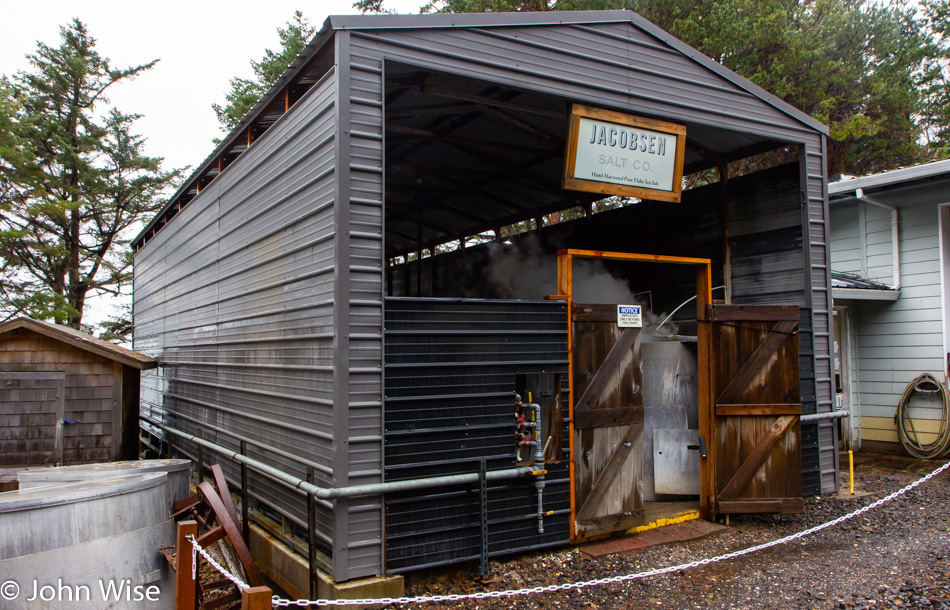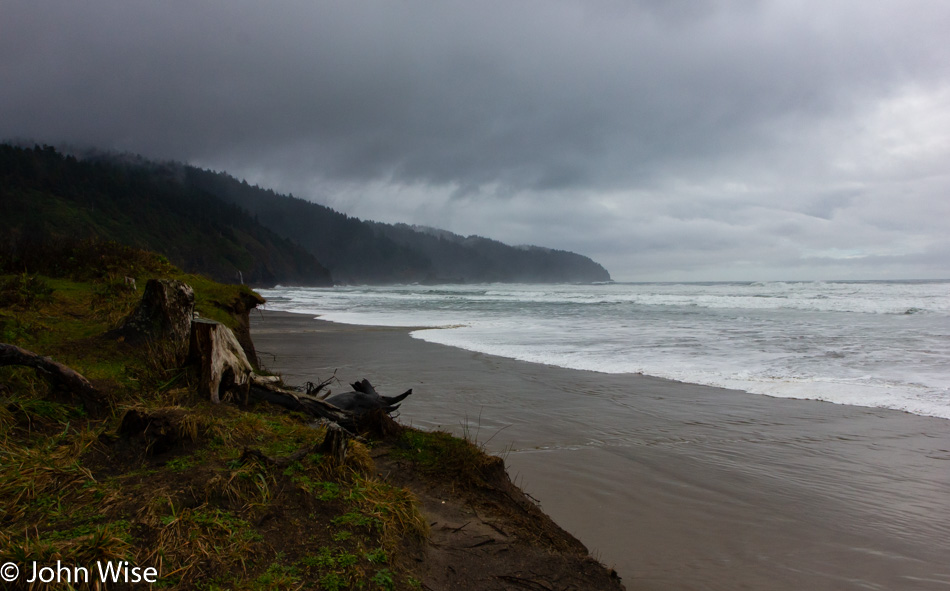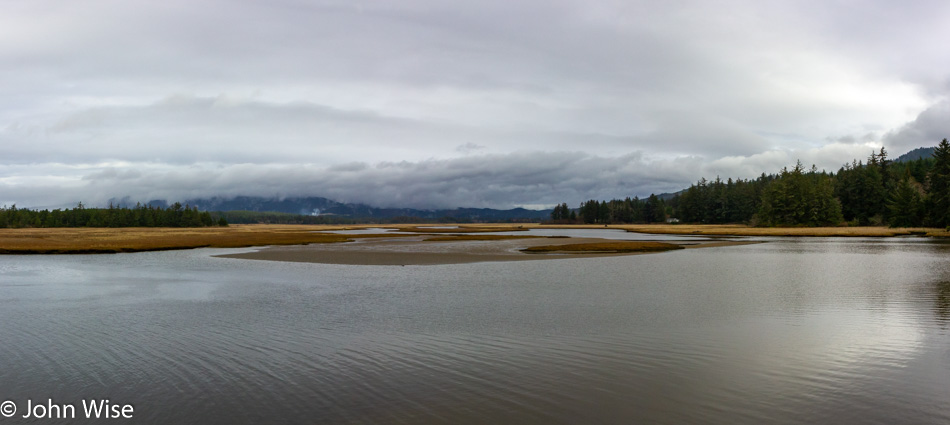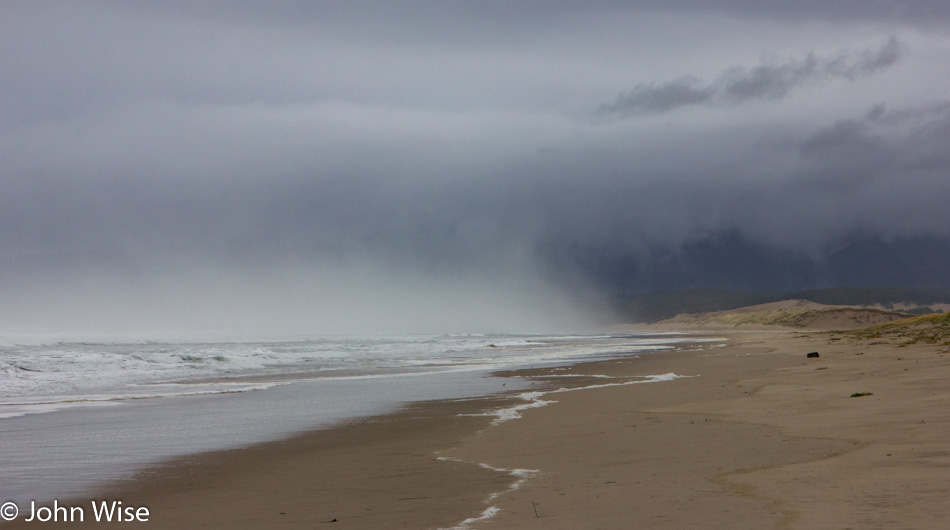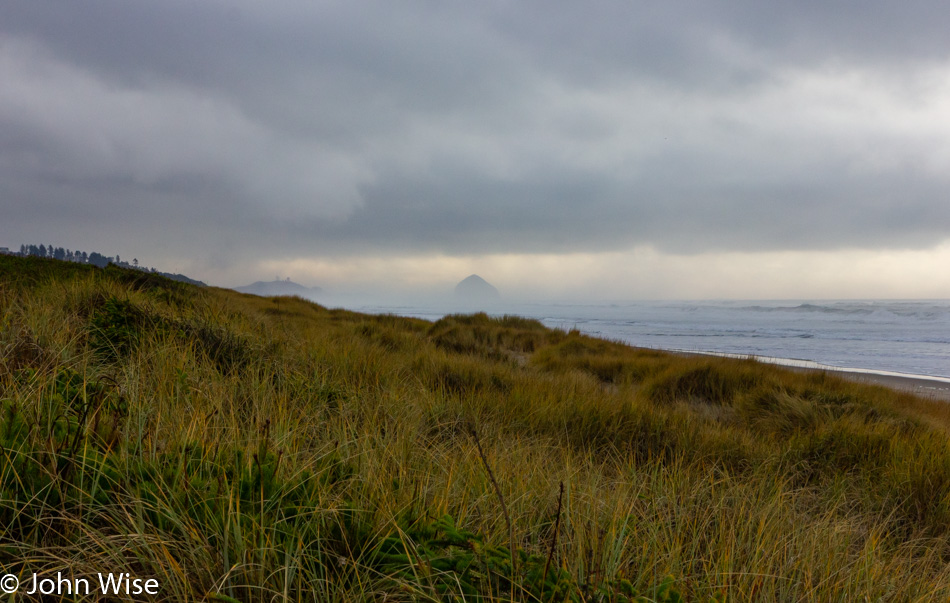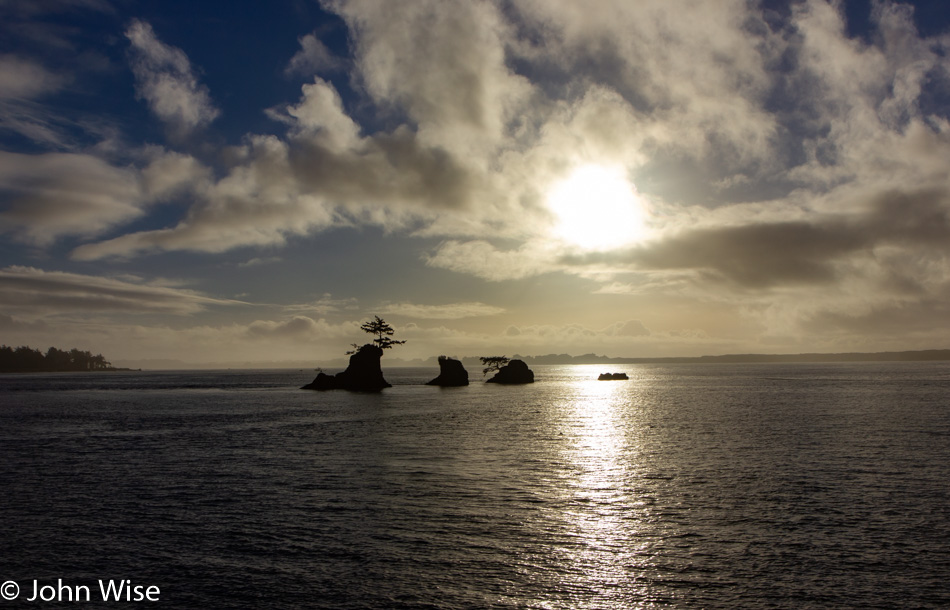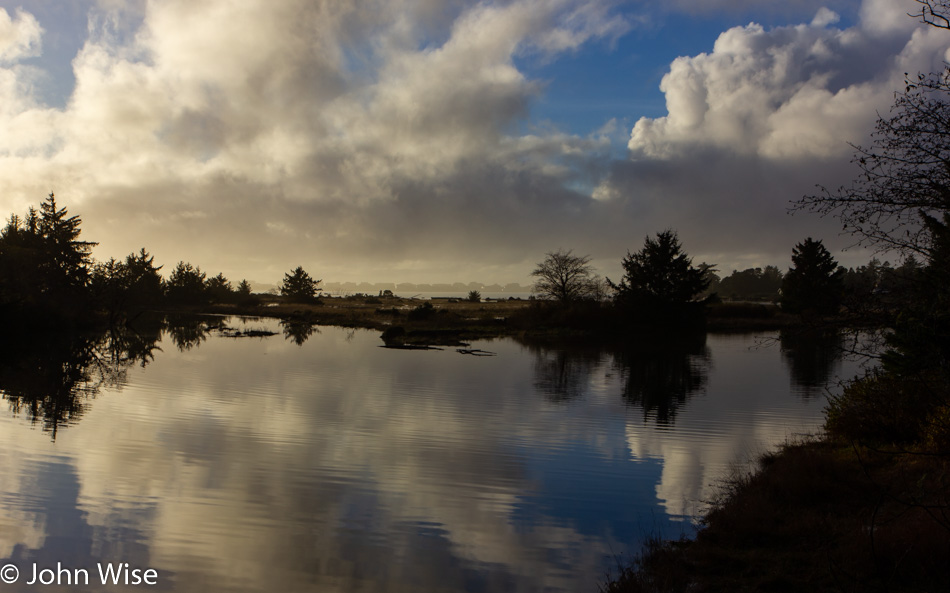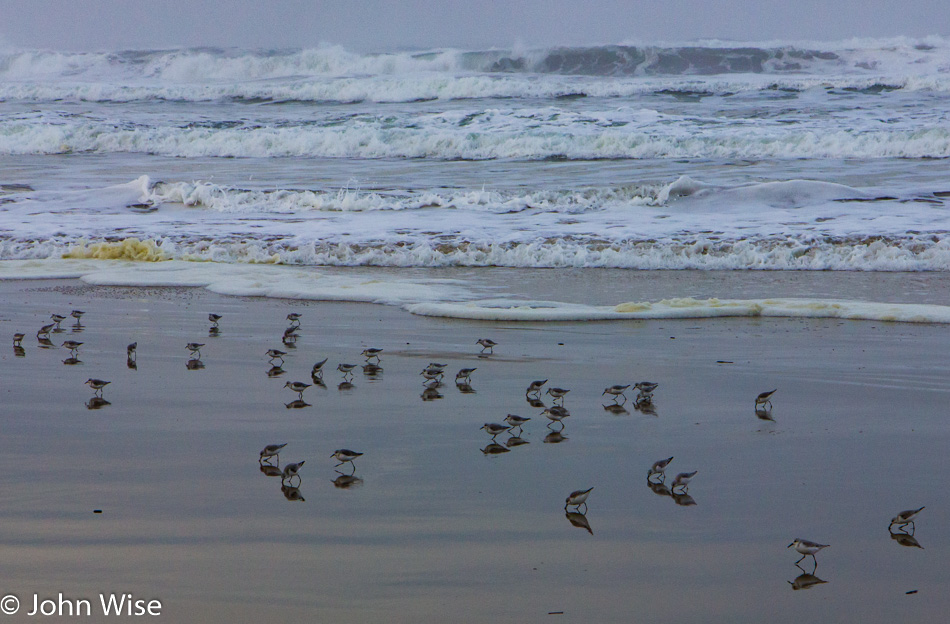
Who doesn’t want to walk along the ocean with the snowy plovers as they are reflected back at themselves, producing an even more beautiful scene? The stormy sea appears to be racing to capture them, and if successful, maybe try to convert them into fish or a kind of mini penguin; who knows? This flight of whimsy catches me as I watch the interplay between the birds and the sea that dance upon the shore. The speed of those legs and their extended beaks demonstrate a perfectly evolved bird package able to burrow for a meal in time with the receding waters. This is a natural elegance we should all stop to appreciate.

Out of destruction comes change, and from that, a different form of beauty arrives. Volcanoes, in their moments of ferocity, appear dangerous until their violent activity takes a pause, allowing the impact of their disgorging to be seen through the lens of time. This clay sandwiched between layers of sand tells the story of a volcano here on the ring of fire that sent out a layer of ash in a wet environment. As nature continued her story, the sands of time continued to accumulate. Then, in yet another century, the fire and raw earth took center stage again. Another volcano (or maybe the same one) spewed its wrath into the sky and upon the land until, once again, the sand between was trapped under a near impervious layer of fine sediment that would remain damp for thousands of years into the future.

How does the cauldron of the earth’s bowels work? At one moment, the ash that erupts is gray, followed by another eruption of differently-hued ash, creating a multi-colored natural layer cake of sediment. The greenish hue of the top layer is likely caused by the amount of bentonite in the ash, while the blue of the clay below is most likely due to lower concentrations of iron and aluminum. Seeing how I’m in no way a geologist, I can only guess at things here, but to my untrained eye, it appears that the earlier volcanic ash layer with less iron and aluminum was also compositionally different, forming chunks that are quite unlike those of the clay that rests right on top of it.

There’s enough iron in these sediments that they are rusting and adding yet another hue to the palette of the earth on display here next to the ocean. Now, look to the top of this photo, and in the sandstone layer, you might see a couple of bands (more evident on the right side of the image) that are darker than the sand above and below it. My guess is that either the temperature of the ocean had changed for a time, thus producing a variation in the vegetative matter that was settling, or maybe runoff from the land was carrying a layer of sediments from further inland. Of course, all I can do is speculate using my limited knowledge of this kind of stuff, but I can tell you that I certainly enjoy wondering about the beautiful things we stumble upon during our explorations as a form of entertainment. Should we fall into some great amount of wealth during our lives, I would be employing the expertise of professionals able to shed light on these mysteries instead of relying on a smartphone and our ability to ask the right questions. Sometimes, neither is available, so we can only speculate.
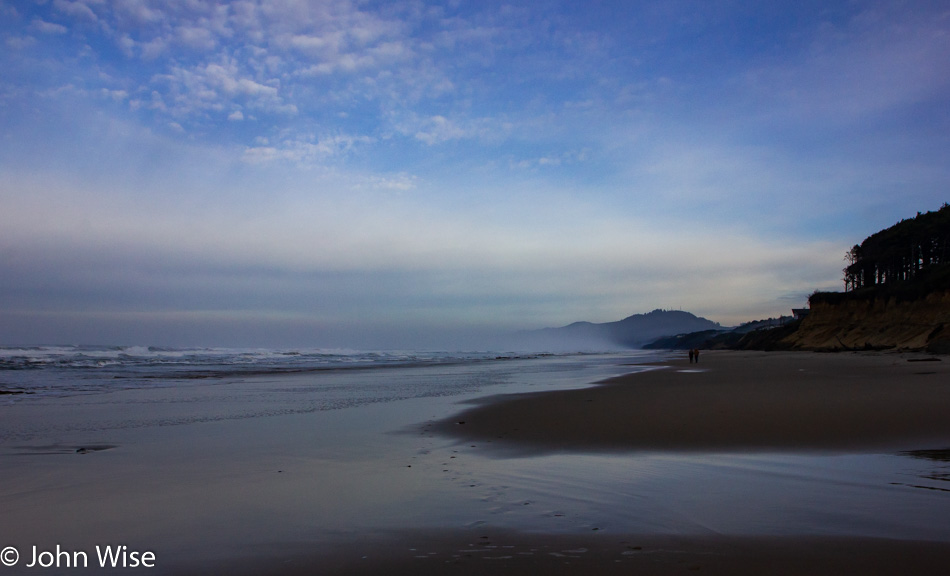
Four years ago, I embarked on a path of building a virtual world called Hypatia. It was never intended to be a game per se but a platform meant to enable people of all ages to start developing skills that are becoming more relevant to being able to participate in our current economy. Minecraft was perfect for drawing children into an environment where digital workmanship and collaboration were key to fostering the individual’s progress. Society at large is also in need of such opportunities and training. The grouping of people who share knowledge to further each other’s potential is known as agglomeration, and many communities and even entire states have but a nascent movement towards that goal.
Virtual reality (VR) may end up being a mere stepping stone to augmented and mixed reality (AR and MR), but VR is available now and can offer access to skills that could be a conduit to greater opportunity while the AR/MR technologies are further refined, and prices brought down. My sense was that if we could use a virtual city paradigm to get people to collaborate in VR, bridging the gap of economic and geographic isolation while spurring them to participate and help us build this digital world, they would, at the same time, acquire some of the skills that would help them create a career out of working with digital information and knowledge systems. Online digital agglomeration in virtual space sounded like a great idea to me.
Why do I believe this is important? There is a lot of information stored in various objects and topographies along the Oregon Coast and the larger world, but I cannot know them all. Augmented reality could offer a mapping of resources and act as a knowledge interface that would allow those of us walking these shores to better identify the elements, history, and forces that are at work here. Just imagine what we could learn about the clay we were looking at above if a Smart AR system was able to identify our location along with the object of our gaze and then tell us the approximate time in Earth’s history when a volcano located at a specific nearby spot on the map laid down the ash. Then it could also tell us more about the chemical composition of the clay and the molecular and medicinal properties that might be known. Maybe early people or contemporary local artists have been using clay to make art. Are there examples of those works in local shops or museums? Smart augmented reality could share that knowledge with people as they are out exploring their world. But millions of trained artists, coders, musicians, and developers would need to work many years in order to see this come to fruition.
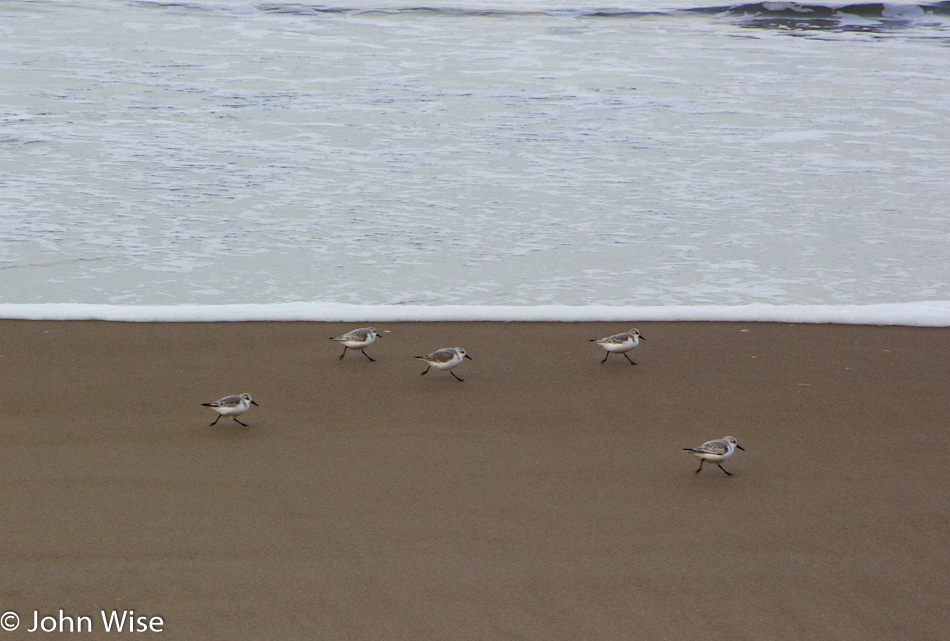
How fast do these western snowy plovers run? Are they migratory? What’s in their diet? We cannot ask the birds themselves to help us understand them, and sadly, there are never any ornithologists just hanging around when you need one. A smart augmented reality system would identify the birds and their traits, teaching us about their habitats, if they are endangered, and what their nests look like. We could bring up MRIs, x-rays, and molecular diagrams of their bone and feather structures that help make them particularly adept for life on the shore.
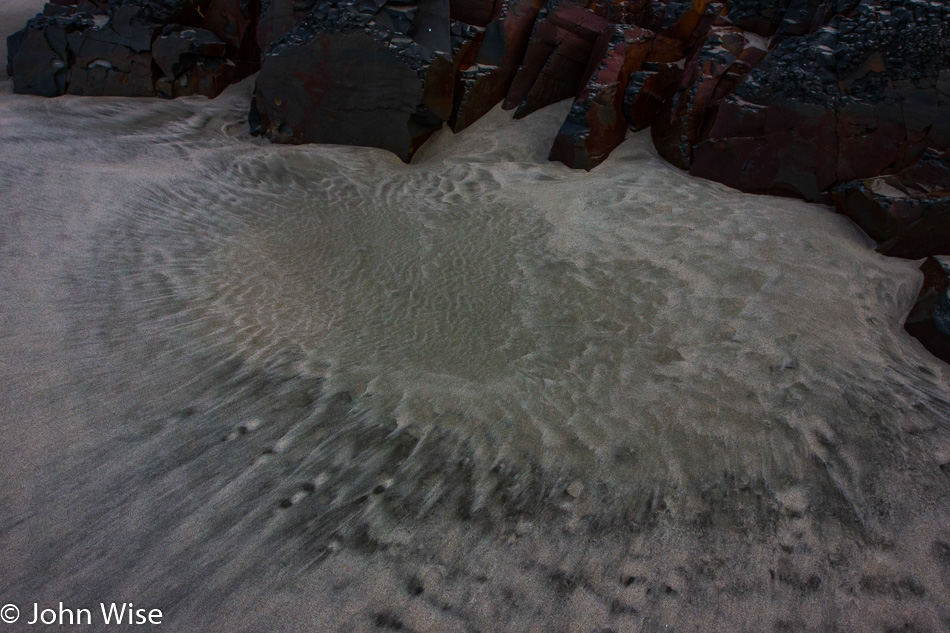
Fluid dynamics are a complex side of science, and while I can make a wild-ass guess as to how the receding water, along with different elements within the sand, work to align particular types of grains to create such beautiful patterns, I have no real knowledge about these processes. My point is that just as there are countless grains of sand in this photo alone, there are countless pieces of information and 3D models to be built that could be assembled into teaching systems delivered to everyday people out exploring the world while on vacation or out in the field learning. This exposure to knowledge furthers our vocabularies and allows us to see our world not just from the superficial recognition that the walk along the ocean is beautiful but also that at a more intrinsic level, it can be astonishing when we start to understand it at a granular level.

Many people in our current age are stuck like rocks in petrified sediment that doesn’t allow them to break free of intellectual nearsightedness. Like the ocean wearing down the coast, it crashes into humanity, and our use of knowledge must act as the sea to help loosen those locked into their own tight orbits of intellectual rigidity to reach an escape velocity, allowing them to deploy their minds for the betterment of all of us.
Obviously, this is not an overnight solution where a tempest of thought lands upon the shore of our brains, offering instant enlightenment; we must be a persistent wave battering at the immovable rock. Nearly ten years ago, I wrote a tongue-in-cheek blog entry about universal basic income that I believe still has some salient points. If we were to start exploring something along the lines of using participation credit to boost income along with a culture-wide program to lift our digital literacy, I think we’d be laying the foundation and building blocks to help bring us into the next stage of our economy.
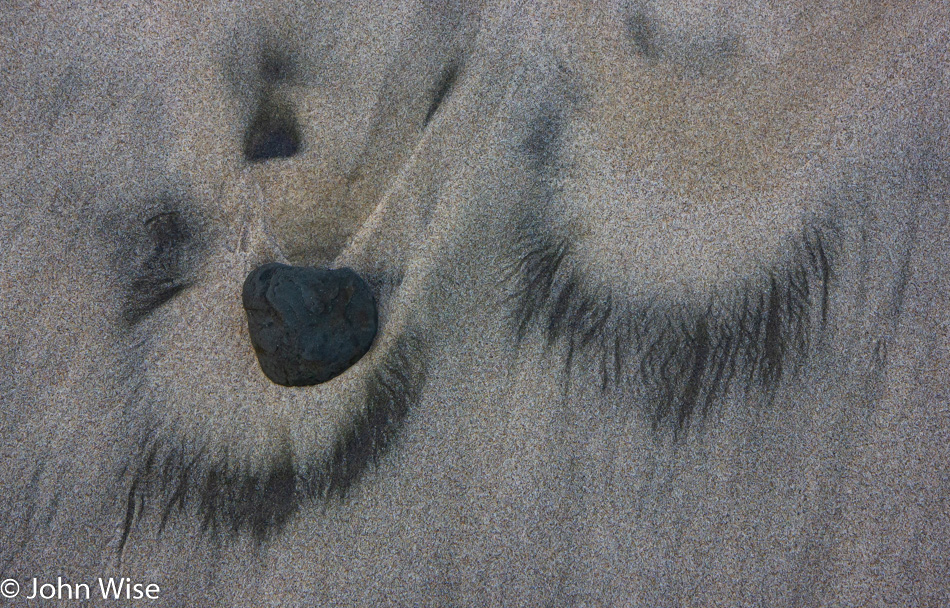
Even the chaotic properties of rushing water and grains of sand can work together to bring visual order in beautiful accidental patterns. It is then my hope that the intentional minds of humans able to exercise deterministic ideas might also find a symbiotic relationship that would allow us to assemble within our own chaotic universe of thoughts and actions the energy to once again find a common vision. Across history, we have striven to tame nature, develop agriculture, and utilize basic elements to make metals; we have organized ourselves into cities and states, learned to understand the universe, and share knowledge with a thin wafer of silicon, glass, and a flat battery gathered in a package that fits in our pocket. Humankind is not yet at the frontier of taming the planets found circling other stars, but we must continue to endeavor to improve our lives in our own time and on our own planet.
A people without purpose is capable of going to war in order to find a renewed sense of that purpose. I, for one, do not want to lose or sacrifice loved ones because we are choosing the path of continued ignorance after such a long period of great advancements. We must ask ourselves what makes sense that we can work towards at this moment in history that allows all of us to share in trying to accomplish the impossible. How can everyone looking for a greater purpose contribute to the betterment of our species and help provide a healthier, more supportive environment and home for our children and ourselves? This goal must extend beyond our most successful cities and embrace those who remain isolated from the participation of building the future.

It’s time for us to move away from the public spectacle of being a constant witness to the tragically absurd lives of politicians and celebrities and bring the focus back to what our roles are as individual citizens working to make our communities, states, country, and planet better places. We cannot wait for the wealthiest to share a modicum of their treasure in some trickle-down fashion so that maybe in a thousand years, your town will finally be a financially viable outpost where your descendants will want to retire.
We need a universal basic income agreed to for the entire planet. It must be as ubiquitous as oxygen, something we all have access to. We need a planet-wide goal of helping the ecosystem best support each and every one of us. We can start that process with a basic income and a goal of recording, creating, and sharing all the knowledge locked in the various natural and cultural systems of our earth. I may never make it to Tumba, Rwanda, in Africa, but why shouldn’t I be able to learn about the people who live there and how they coexist with the flora and fauna in the area instead of watching a rerun of Game of Thrones? [Note: I have never watched Game of Thrones or much of anything else on television since 1985] Sure, I can learn what’s available about Tumba on the internet, but I want an immersive experience that takes me to a face-to-face encounter with the Tumbanese without me having to fly halfway around the world.

Life is like this pattern in the sand in that it will not be here long. Our lives are profoundly short, and the patterns that flow through our perceptions should always be shifting, reorganized by the sea of experience. The good fortune of having been born in this age is that we’ve been able to witness the ushering in of a ubiquitous form of electronic knowledge sharing that must also evolve. We are all witnessing the social problems that are associated with intellectual stagnation and being locked into aging paradigms that do not offer growth and progress. We see it with Brexit, the Yellow Vests in France, with Donald Trump, and the rise of populism. We should resist the temptation to exercise our anger and instead deploy our better natures to rise to the challenge of improving ourselves and our neighbors, wherever they may be on earth.
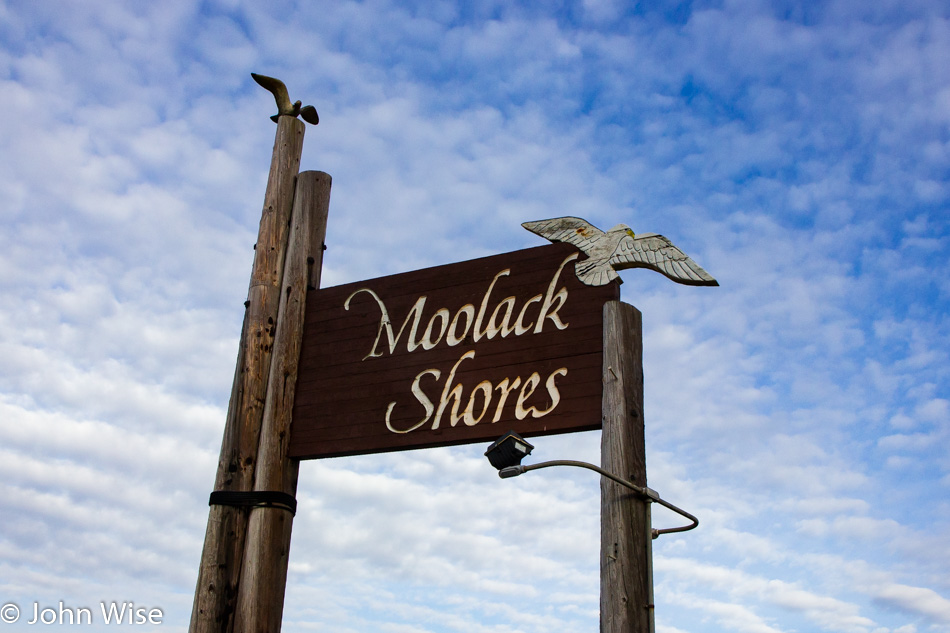
This blog entry has become a short story, as now it’s over 2,000 words, and I’m only on the 12th image of 30. It is going to become increasingly difficult to share meaningful thoughts without digging deeper into subject matter that may not really relate to our day of meandering, though why shouldn’t the mind meander just as the body and eyes do? This overnight at Moolack Shores north of Newport is part of our effort to explore every bit of the Oregon Coast with as fine a granularity as possible. To date, we have stayed at 13 state parks along this segment of the Pacific Ocean and 12 towns in between, so on average, we have spent a night every 14 miles out here on the western side of Oregon.
For more statistics, we first visited back in 2003 and have now been up here 11 times and even visited twice back in 2011. By the time we are done with this trip, we’ll have accumulated a total of 68 days spent just along the Oregon coast. We’ve also traveled the Columbia River Gorge, spent some time in Crane Hot Springs, Crater Lake, and Portland, and traveled the interior of the state. Now, the sad or maybe good news: some of you reading this might think we’ve been lucky to take nearly a dozen vacations to Oregon with an average stay of about six days, but this is only about 0.2% of our lives so far. Please think hard about that. We’ve stayed over two months on the Oregon coast while on those vacations, and it barely registers as a tiny percentage of all of our time on Earth. Even if you were to travel on vacation two weeks a year every year from the time you are 18 until you are 80, you will have spent a mere 3% of your waking days on serious vacations where truly new experiential opportunities exist.
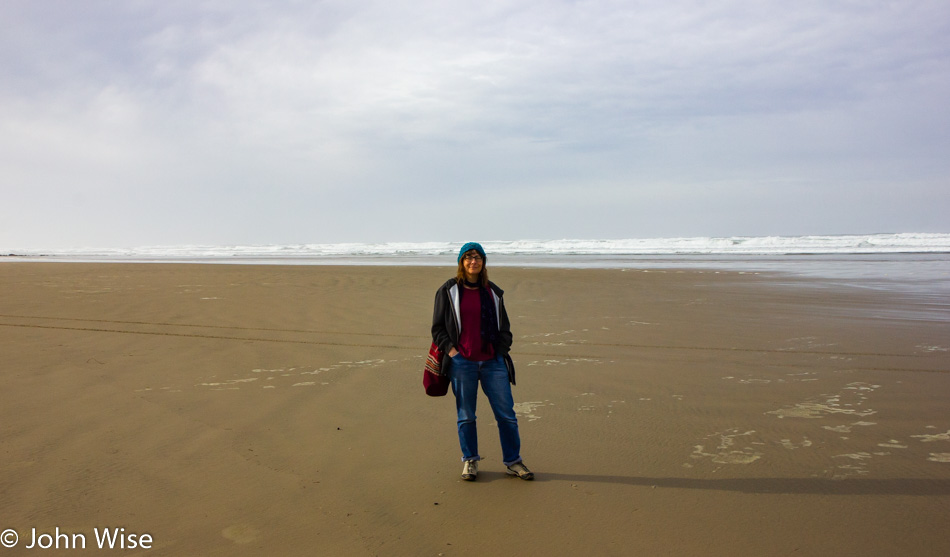
You must get out and stretch your limited time for gathering experiences on the planet you live upon. There’s no good excuse that stops you from venturing out of your routine. Find someone who will help you if you must. Just go out 20 miles from home if that’s the best you can do, and if you’ve never been more than 5 miles from where you grew up, you really have an urgency to get out. I know that some people reading this will find it hard to believe that there are those who have stayed within a 5-mile radius of where they’ve always lived, but I’ve heard that sad story countless times. This woman in the photo you’ve seen many a time on this blog is 5,295 miles (8,522 km) from her birthplace in Frankfurt, Germany, and yet she’s walked in the halls of the White House, climbed the Statue of Liberty to stand in the largest crown on earth, rafted the Colorado River (yeah I wrote a book about it), snorkeled in Hawaii and Florida, went snowshoeing in Yellowstone, strolled the streets of New York City, and went leaf-peeping on the Upper Peninsula of Michigan. Between all that, she’s been to every state in the U.S., and we found time and resources to visit Europe more than once.

The point is not to brag but to beg people to live with intention and a larger purpose than lying around like a beached jellyfish. Vacationing is a great balance and reward for the investment in pushing your life forward. Then, once you reach that point where your rewards have been great, it starts to occur to you that it would make life all the better if you could help others reach these heights. But all the wishing in the world and playing the lottery of passivity while complaining about other’s unfair advantages will never propel you out of the situation where you find yourself stuck in place.

The path could be paved with many dead ends, and often, you will feel you are going in circles, never arriving at a destination, but again, you must persevere. Sometimes, we must become aware that we are walking over missed opportunities because we don’t have it within ourselves to deal with the discomfort of doing something we’ve already convinced ourselves is not a thing we would like. But like this pattern in the sand, I have no idea what created it, and I could have easily walked right by, but there’s something intriguing here, so I stopped to photograph this sand anomaly so I could possibly learn what made this after I got home. Try as I might, I’m just not finding a clue. Someday I hope to return to this post and update what it was that created these patterns. Though I’m still lacking that knowledge, I’m not discouraged that I don’t know everything and that I can take great comfort in the fact that I will continue this journey of seeking and not always knowing.
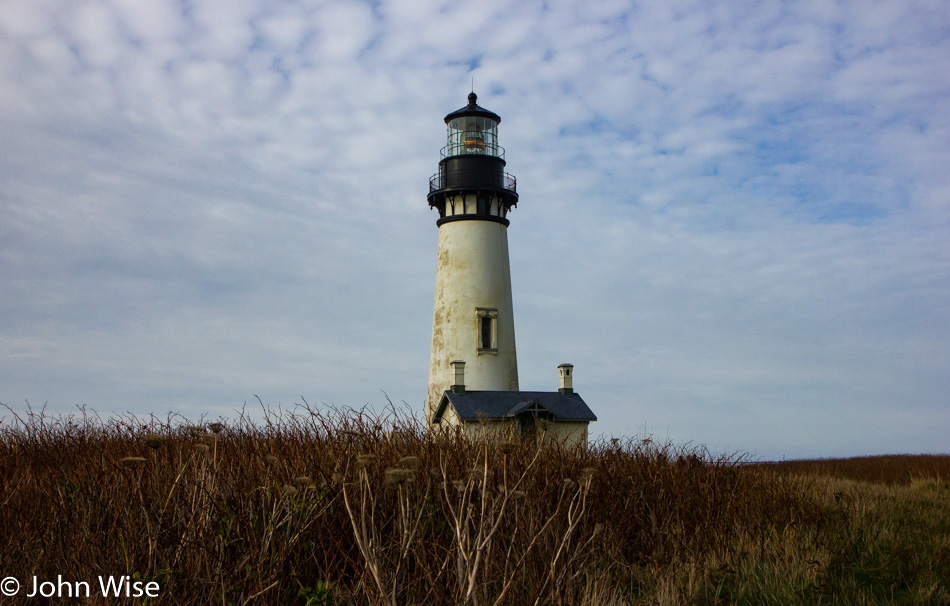
If you are still with me on this tiny tome, let the lighthouse be the signal that we are again encountering a story of travel not of the mind or the economic future of humanity but of two people achieving another milestone. It has taken years to connect with the Yaquina Head Lighthouse, as on previous visits, we couldn’t coordinate our arrival time with one of the tours that are offered. Matter of fact we’d first shown up today two hours early and left. Little did Caroline know that I had planned on us returning, but for a time, she was disappointed that we’d missed the chance yet again. The three previous photos were taken on Agate Beach in Newport, where we took a long walk down nearly the entire length of the beach. Funny enough, I’d lost track of time until, at 11:25, I looked at my Fitbit and panicked a little. I immediately called the lighthouse and asked if we were the only two people who wanted to go on the tour and that they please hold it. It had taken 80 minutes to walk down but only took about 10 minutes to return as we hoofed hard to get back to our car.
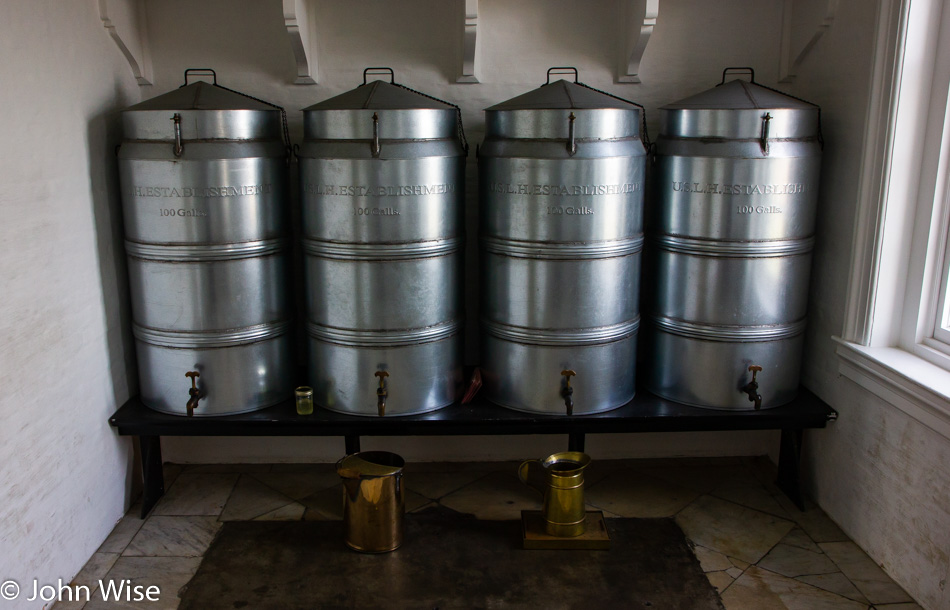
We had 10 minutes to spare when we got to the visitors center, and five minutes before the beginning of the tour. We were standing outside the door of the lighthouse with about ten others, waiting for our guide to welcome us in. Stacy, dressed in garb from the era, was our guide and knew her subject matter. Here we are in the oil room that at one time was fitted with 10 of these barrels used to store 100 gallons each of porcine fuel that was used to keep the flame upstairs alight. We learned that the light burned more fuel in the winter, which only made sense as the days were short and the nights quite long.
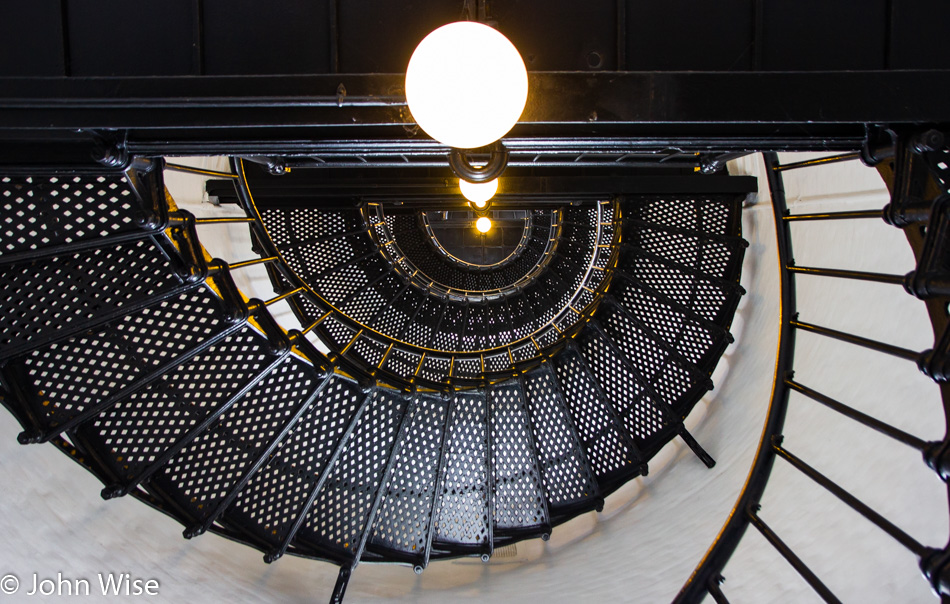
There are 114 steps to the top of the lighthouse, which was built starting back in 1872. The flame was first lit by Head Keeper Fayette Crosby on the evening of August 20, 1873. With our visit to Yaquina Head today, we have now visited all but one of the visitable lighthouses on the Oregon coast.
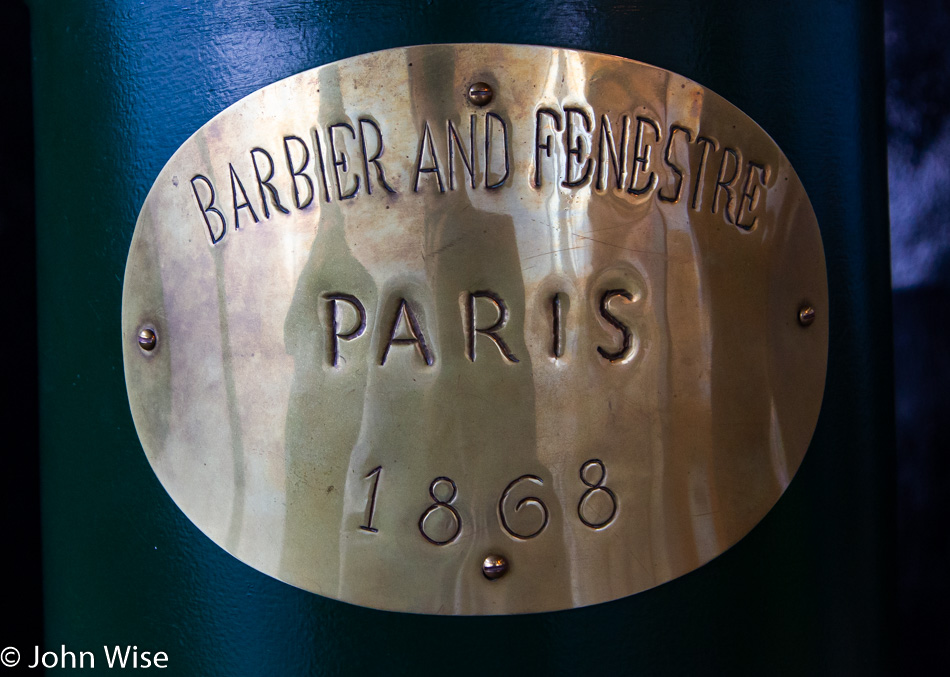
The group made its way up the iron staircase with us spaced apart so as not to put too much weight on any one section. In the space below the Fresnel lens where the keeper of the light would spend their duty time ensuring the light remained lit overnight, we squeezed into the small space to hear more of the history of this 93-foot tall beacon. I immediately fell for this hand-stamped maker’s mark that, to my eye, looked like the original. Turns out that the company was founded just six years prior by Frederic Barbier and Stanislas Fenestre, who built the Fresnel above us. For a time, they were the world leaders in the manufacturing of this most important element of a lighthouse. The company closed down in 1982 after 120 years in business.
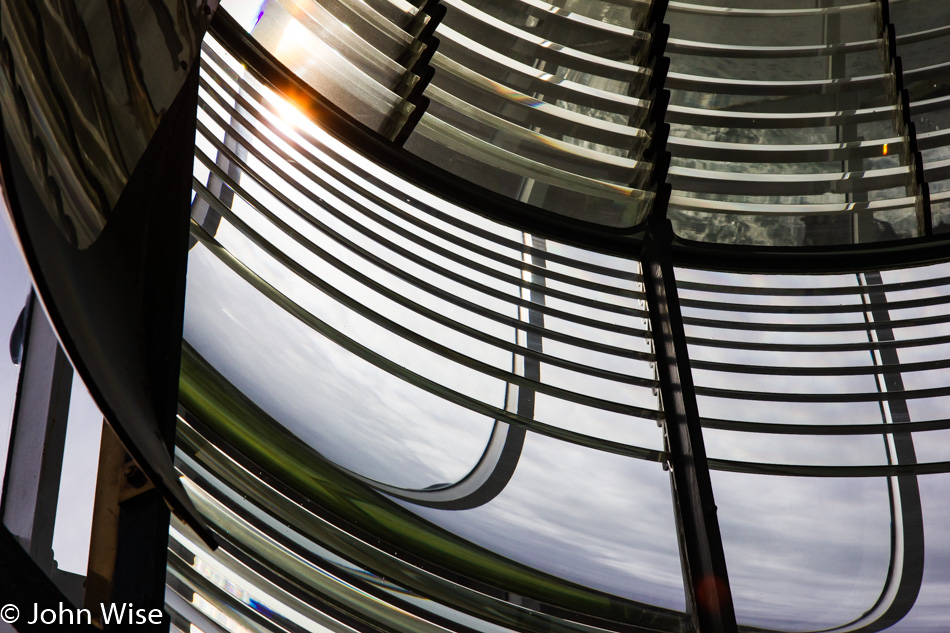
This is the original 150-year-old lens that has always made Yaquina Head home. The land it sits over juts out nearly a mile into the Pacific, which was a great location to place the lighthouse.
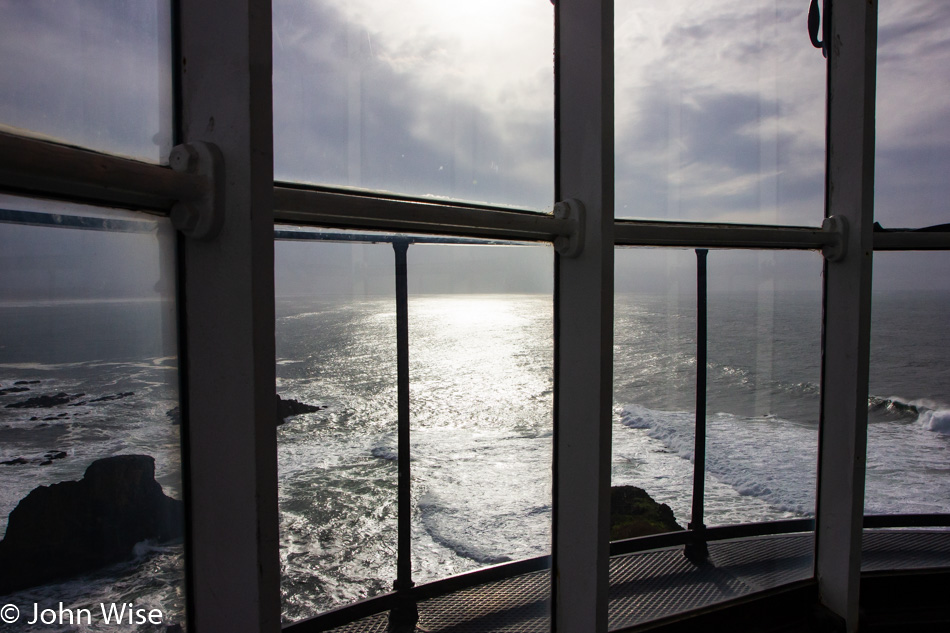
Our view of the ocean, once we got to poke our heads up into the lantern room where the Fresnel resides is spectacular. One easily gets the sense of staying perched high above the roaring surf as the wind howls and the thunderous ocean crashes into the land surrounding the lighthouse. The walkway around the outside of this space is not allowed for visitation as safety for the visitors and the preservation of fragile parts of the lighthouse is of primary concern.
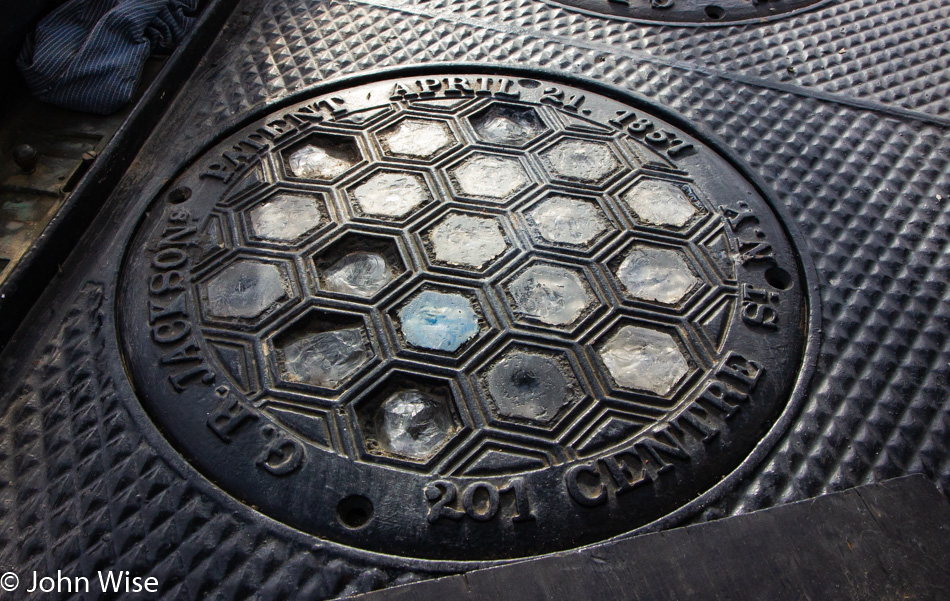
These panels on the floor allowed light from the rotating beam to spill through the thick crystal-like glass pieces fixed in iron so the light keeper could monitor things from the warmth of the service room below.
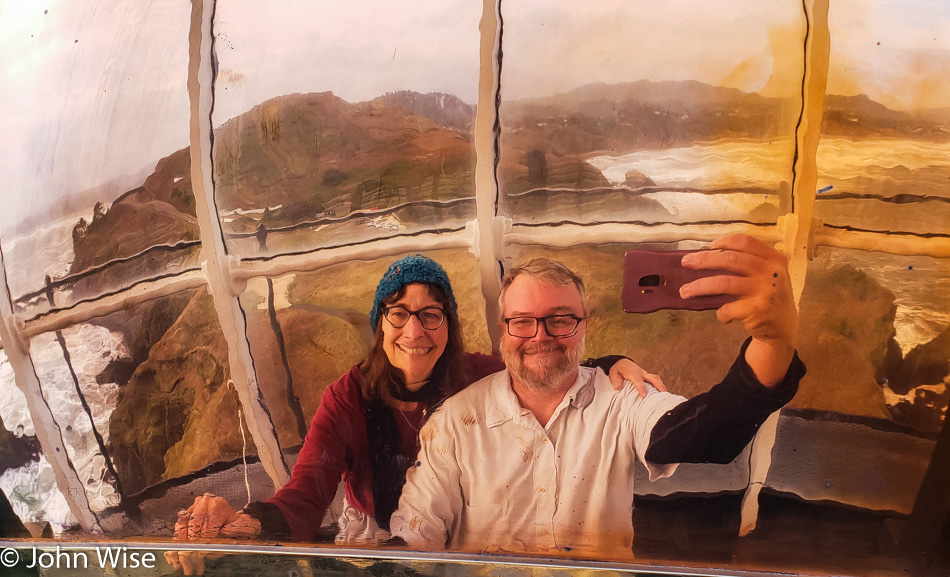
A reflective piece of hand-hammered brass acted as our mirror at the top of the lighthouse in the lantern room. Stacy was nice enough to allow us both a second jaunt up the stairs to snap a distorted selfie with the coast looking north on the right and south towards Newport on the left.

This is the Devil’s Churn inlet south of Yachats at Cape Perpetua. This is one of the worst possible places for Caroline and me to visit on a stormy day, as I’m likely going to get lost in the crazy surf that slams into this narrow cut into the basalt.

Every femtosecond in the presence of this cauldron, there’s a temporary sculpture of extraordinary beauty transitioning from one form through millions of other forms. The chaos wrought by the fluid dynamics is being spectacularly demonstrated as the ocean forces the energy of its waves into this crevice. There’s a power on display that intimidates me and has me standing well back from any potential of a rogue wave scooping me up to drop me in the maelstrom of unbelievable consequence. My imagination races as fast as the rushing water at the thought and feeling that would only briefly be experienced if one were being tossed about in water that never stops heaving and contorting in an inescapable trap.

I keep one eye on the camera’s viewfinder and the other, paying attention to waves crashing on the rocks while this amassing wave careens forward to squeeze into an even narrower crack in the rock before hitting the unseen back of the inlet where, on occasion, the water can splash well over a hundred feet into the air. As my eyes dart around, trying to observe all of the insanity and my ear tunes in the roar of the exploding water, I’m snapping away, hoping my camera might capture but a few good shots that best exemplify the abstract forms found surfing above the water they ride in on.

After dozens of shots are taken, I tell myself that it’s enough, but it is never enough. Every time we are here when the ocean is pulsing in fury, I’m reminded of the Japanese woodblock print titled “The Great Wave off Kanagawa” by Hokusai. I stand in awe of the art that nature is showing me.

A casual glance doesn’t allow one to fully appreciate these images, nor does the resolution that I share them with.

Non-stop exhilaration pumps as my adrenaline demands that I stay just a few more minutes. Maybe the next surge will produce the crashing wave that fills the chasm from side to side, frightening me enough so I run back to our car should I be so lucky to survive. Only then might I be satisfied that I truly stood at the precipice of oceanic hostility and survived its wrath and better understood its potential to fully seize and shake my sense of amazement to a magnitude not yet experienced.

With the light soon to start its fade out and 80 miles (128 km) still ahead of us before reaching Sunset Bay State Park in the dark, we needed to get going. It has taken us all day to move only 30 miles (48 km) down the coast. Our progress was quite reasonable, though, as we’d never visited Moolack Beach before, and we finally were able to tour Yaquina Head Lighthouse.
